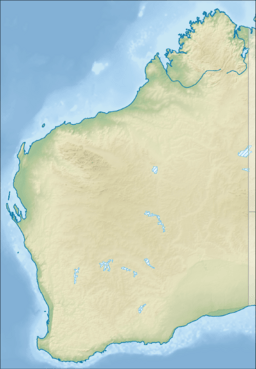Lake Cronin facts for kids
Quick facts for kids Lake Cronin |
|
|---|---|
| Location | Wheatbelt, Western Australia |
| Coordinates | 32°23′8″S 119°45′54″E / 32.38556°S 119.76500°E |
| Type | freshwater |
| Primary inflows | Groundwater and surface runoff |
| Basin countries | Australia |
| Surface area | 3 ha (7.4 acres) |
| Surface elevation | 387 m (1,270 ft) |
Lake Cronin is a special freshwater lake in Western Australia. It's found in the Wheatbelt region. The lake is about 86 kilometers (53 miles) east of Hyden. It is also about 370 kilometers (230 miles) east-southeast of Perth. This lake is part of the huge Great Western Woodlands. It's not always full of water; sometimes it dries up. This is why it's called an ephemeral lake. The lake is protected within the Lake Cronin Nature Reserve.
Contents
About Lake Cronin
Lake Cronin is a unique freshwater lake. It is located in the goldfields area of Western Australia. Most lakes nearby are very salty. But Lake Cronin's water is quite fresh. It has low levels of 'total dissolved solids', which means it is not salty. The lake covers an area of about 13 hectares (32 acres). It is recognized as an important wetland for Australia. It is listed in the Directory of Important Wetlands in Australia.
The lake is surrounded by large areas of woodlands and shrublands. These areas are mostly untouched. However, some land nearby has been cleared for farming. The climate here is semi-arid. This means it has hot summers and cool winters. It gets about 350 millimeters (14 inches) of rain each winter. The land around the lake has hills and sandplains. There are also salt lakes in the valleys. These areas drain water inwards. The hills are part of a large 'greenstone belt'. This belt runs from north to south. There are also isolated granite rocks.
Protecting Lake Cronin
An area of 1,050 hectares (2,600 acres) around the lake is a Nature Reserve. It became a protected area in 1980. The Environmental Protection Authority first recognized it in 1975. The lake's wetland is very important. It has a surrounding area, called a catchment, that is almost completely natural. This makes it a nationally important wetland.
Amazing Plants of Lake Cronin
The area around Lake Cronin has many different types of plants. There are 24 different plant communities here. This includes 16 types of plants that are important for conservation. The area has sandplain heath plants. It also has low eucalyptus woodlands and mallees. Some of the plants you might see include Acacia asepala, Boronia westringioides, and Melaleuca uncinata. You can also find Eremophila serpens and Eucalyptus exigua.
Animals Living Around Lake Cronin
Lake Cronin is a vital home for many animals.
Birds of Lake Cronin
Many waterbirds live at the lake. These include grey teals, pink-eared ducks, and Australian shelducks. You can also spot black-tailed native-hens. The plants around the lake also support other birds. These include the striated pardalote, western rosella, and blue-breasted fairy-wren. In 1988, surveys found 90 different kinds of birds in this area.
Frogs and Their Homes
The lake is also home to many frogs. Seven different frog species have been found here. Some frogs breed in summer, like Neobatrachus centralis and Pseudophryne occidentalis. Others breed in winter, such as Helioporus albopunctatus, Lymnodynastes dorsalis, and Neobatrachus pelobatoides. This area is also the only known place to find Denisonia atriceps, a rare type of snake.
Mammals of Lake Cronin
Fifteen different kinds of mammals live in this area. These include the white-tailed dunnart and Gilbert's dunnart. You might also see the Mitchell's hopping mouse and the western pygmy possum.
 | Sharif Bey |
 | Hale Woodruff |
 | Richmond Barthé |
 | Purvis Young |


